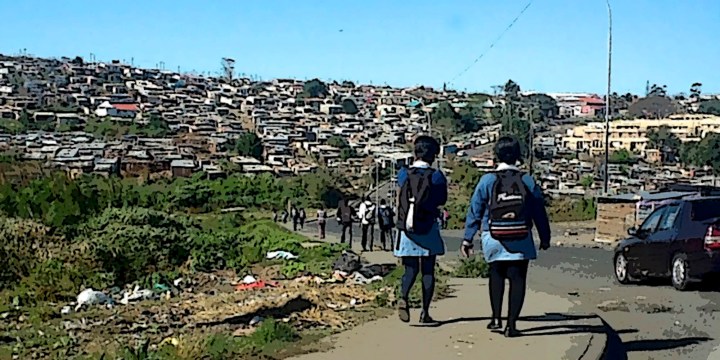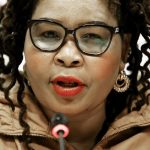OP-ED
Knowledge is power: The case for Comprehensive Sexualities Education in South Africa

The Department of Basic Education’s plans to improve comprehensive sexualities education for learners have caused a moral furore. But claims that the new curriculum ‘sexualises children’ and ‘promotes perversity’ are false. The new curriculum will help learners build an accurate understanding of their bodies and develop healthy attitudes and behaviours when it comes to sexuality, identity and relationships.
Comprehensive sexualities education (CSE) is not a new phenomenon in South African schools, nor is its implementation the result of external groups “imposing” foreign ideologies on to unwitting locals — as its opponents allege. South Africa has implemented comprehensive sexualities education through Life Orientation classes for almost two decades (beginning in 2000). The curriculum has been implemented in part as a response to the severe impact of the South African HIV pandemic, alongside high rates of gender-based violence.
In 2013, South Africa was one of 20 countries in Eastern and Southern Africa to endorse the landmark Inter-Ministerial Commitment to scale-up comprehensive sexualities education and access to sexual and reproductive health services for adolescents and young people.
All signatories committed to implementing good quality sexualities education in schools, and to providing rigorous in-service and pre-service training for teachers to equip them with the knowledge and skills necessary to implement age-appropriate and contextually-specific comprehensive sexualities education. It is through the commitments of the South African government, in partnership with neighbouring African states, that support for the new comprehensive sexualities education curriculum originated.
These commitments are also enshrined within numerous South African national policies, such as the National Strategic Plan on HIV, TB and Sexually Transmitted Infections (2017-2022). The plan bolstered South Africa’s commitment to strengthening HIV prevention, particularly among youth. It identifies comprehensive sexualities education as one the key game changers in South Africa’s HIV epidemic, and supports the implementation of strategies that provide adolescents and young people with knowledge, skills and efficacies to make informed decisions and positive lifestyle choices regarding sex and sexuality.
Empirical research, not dogma, supports the new curriculum
Whether or not you support comprehensive sexualities education programmes at schools, empirical research located in South Africa demonstrates the urgent need for improved knowledge and understanding about sex, the potential risks of sexual activity, and the necessity of sexual consent. The Fifth South African National HIV Prevalence, Incidence, Behaviour and Communication Survey (SABSSM V), conducted by the Human Sciences Research Council (HSRC, 2017) found that approximately 7.9 million people in South Africa were living with HIV. Young women aged 15-24 had the highest burden of HIV incidence of any other age group, with 100,000 new infections in 2017.
While HIV incidence remains high, especially among young people, the most recent HSRC survey points to an alarming lack of accurate knowledge about HIV and its transmission. The survey found that only 36% of the national population (aged 15 and above) had correct knowledge of, and was able to reject myths about, HIV transmission.
Low and declining levels of accurate understanding about HIV transmission were also captured in a recent study conducted by the Southern and Eastern Africa Consortium for Monitoring Educational Quality. The study found that fewer than 40% of grade 6 learners had accurate knowledge about HIV prevention.
The rape and murder of UCT student, Uyinene Mrwetyana, in August 2019, shone a spotlight on South Africa’s continuing high rates of sexual violence, sparking righteous outrage over the state’s ongoing failure to reduce and stop astonishingly high rates of sexual and gender-based violence. But Mrwetyana’s death pointed not just to the crimes of an individual, but to the workings of a society in which sexual violence and assault are not aberrant, but normative.
High levels of violence have been a prominent feature of South Africa’s history. From a global perspective, South Africa has extremely high levels of violence and criminality. According to the South African Police Services (SAPS) Crime Statistics report of 2018 – 50,108 cases of sexual offences were reported in 2017/8. Over the last two-year reporting cycle, femicide (that is, the murder of women) increased by 11%. South Africa’s rates of femicide are almost five times higher than the global average. Moreover, Statistics South Africa, in the 2018 report on “Crime against women in South Africa”, estimated that 138 per 100 000 women were raped in 2016/17: the highest rate in the world.
These statistics pose crucial questions about how South Africans are sexually socialised, and challenge us all to rethink how to provide and sustain better understandings of the causes of sexual violence, and the means by which it may be stopped. In her speech at Mrwetyana’s memorial service at UCT, the former University Chancellor Graça Machel stated:
Something absolutely and deeply wrong is happening in our society. What has happened, where did we fail? What is happening that our families are nurturing murderers and rapists. It is in our families… What has gone so wrong?
What has gone wrong, in part, is that millions of young South Africans lack accurate, human rights-based knowledge about sexuality and sexual health, because neither their homes nor their schools have provided this. Instead, as a copious literature shows, many young people learn about sex from other young people and, with increasing access to the internet, through pornography.
To address this critical dearth of knowledge, and to counter-balance the ubiquity of misinformation and misrepresentation of sex and sexualities, what is needed is a curriculum that helps empower young people to build an accurate understanding of their bodies, to make sense of their developmental stages, to grasp the concepts and content relating to their bodies, and to develop healthy values, attitudes and behaviour when it comes to sexuality, identity and relationships.
The Department of Basic Education has developed precisely this kind of curriculum, publishing its new scripted lesson plans for the comprehensive sexuality education component of the Life Orientation curriculum last week. The content is age-appropriate and contextually relevant. The terms used in the Scripted Lesson Plans (SLP) are clearly explained and constantly reinforced, building on content taught in previous grades. Each concept links to other content areas in the national curriculum, and is set out in a way that encourages creativity, critical thinking and reflection. The content is values-based and rights-based, and focuses on building safe learning spaces. It encourages small group discussion as well as discussion with parents or trusted adults at home.
The curriculum aims to equip learners to understand the meaning of consent, agency and choice. This is essential in leading safe and healthy lives and in conducting safe, healthy relationships. Knowledge is power, and it is only through educating our youth that they will be empowered to make informed choices that will impact and influence the rest of their lives, as well as the lives of their families and the broader society.
Debunking the claims of the anti-CSE lobby
In May 2019, the Department of Basic Education announced that comprehensive sexualities education would begin at grade 4. The Department published a statement, confirming its plans to reform the sexualities education curriculum, in line with international best-practices. But “Curriculum 2020”, as it has come to be known, has been the source of growing opposition ever since, much of this ill-informed or downright inaccurate.
In August and October 2019, the African Christian Democratic Party (ACDP) organised marches to the offices of the Department of Basic Education to protest against the new curriculum which, it claimed, “encourages children to engage in oral, anal, homo and heterosexual practices, among other horrific sexual teachings”.
While many political pundits have condemned the new curriculum, nowhere in the debate about CSE have parents, teachers, principals, or politicians described precisely what information young people need to make informed, healthy choices about their lives. Nor have they explained who should take responsibility for this and whether those who do so outside of the school system are equipped to offer a comprehensive, accurate and empowering overview of sexualities which actually protect young people and provide them with a positive, healthy and life-affirming view of human sexuality. Research shows that young people frequently have questions about sexuality, but do not always feel able to ask these questions of adults, for fear of being punished or shamed.
Members of the anti-CSE lobby claim that parents provide adequate sex education at home, but studies show this is often not the case. Many parents do not teach their children about even the basic facts of sexual and reproductive health. Furthermore, for child-headed households or learners who do not have parents, sexualities education is vitally important and must be accessible at school.
Research shows that comprehensive sexualities education for adolescents has proven results in promoting the uptake of safer sexual behaviours, the use of contraception, and not having multiple sexual partners simultaneously. Comprehensive sexualities education gives learners a greater understanding of their health and human rights, and the essential health services to which they are entitled.
Much of the anti-CSE lobby’s critiques stem from the fact that UNESCO assisted the Department of Basic Education in drafting the scripted lesson plans. The lobby argues that this is an example of the imposition of Western, “white” or “foreign” values, erasing African culture. This is not the case. UNESCO’s guidelines acknowledge that any CSE material must be sensitive to local cultural and moral standpoints, and in South Africa’s case, with what is enshrined in the Constitution.
This very Constitution has as a key guiding principle that the best interests are of paramount importance in every matter concerning the child. Furthermore, CSE is backed by multiple local and regional policies which demonstrate that there is national support for the curriculum. Research has shown, ironically, that some of the important players in the anti-CSE lobby are supported by US-based right-wing organisations. Let us be clear. This lobby says it has the best interests of the child at heart but actually it is engaging in an ideological war which places a moral agenda above the health and wellbeing of young people.
Since the release by the Department of Education of the scripted lesson plans, the backlash against CSE has gathered momentum. A Facebook group of “parents, teachers, principals and schools who oppose the current and planned sexuality education in the LO curriculum for grades 4 to 12”, called #LeaveOurKidsAlone, was established three weeks ago. It now has over 100,000 members.
Posts on the #LeaveOurKidsAlone serve up a hearty hybrid of bigotry. One member wrote [sic]: “Satanic Zio new world order,first feminism ,then gay marriages ,next up Was transgender freak show, now normalization of paedophilia.’ Another replied [sic]: This is a SICK EXCUSE for older adults to rape and molest young children and they use the excuse that the child was fully aware of what they were doing. He or she enjoyed it or lead the way. Fuck this.”
Setting aside vitriolic ranting and conspiracy theories (the “Illuminati” looms large in its discussion forums), the Group’s size demonstrates widespread fears and misconceptions about the comprehensive sexualities education curriculum, specifically regarding its content and its pedagogical objectives.
#LeaveOurKidsAlone is now lobbying government through letters, petitions and protests to remove comprehensive sexuality education from the curriculum. It is becoming increasingly vocal on social media, and its objectives are profoundly at odds with gender equality, sexual diversity and access to sexual and reproductive health rights and services, all enshrined in South Africa’s Constitution. Frankly, the lives of South African children are at stake, and they are being sacrificed on the altar of a morality driven by panic and prurience.
If the #LeaveOurKidsalone anti-CSE lobby gets its way and sexuality education is removed from the school curriculum, they’re right — kids will be left alone, and in the dark, about their sexual and reproductive health and rights. They deserve better. We’ve tried silencing this conversation, and stigma, taboo, myths and shame still cloud sexual and reproductive health messaging — why don’t we give decent education a chance? DM
- Julia Chaskalson is a Mandela Rhodes Scholar, currently completing a Master’s in Development Studies at the University of the Witwatersrand.
- Professor Deevia Bhana is the National Research Foundation’s South African Research Chair in Gender and Childhood Sexuality at the University of KwaZulu-Natal.
- Pierre Brouard is a registered Clinical Psychologist and the Deputy Director of the Centre for Sexualities, AIDS and Gender at the University of Pretoria.
- Dr Rebecca Hodes is the Director of the AIDS and Society Research at the University of Cape Town.
- Dr Sisa Ngabaza is a Senior Lecturer in the Department of Women and Gender Studies at the University of the Western Cape.
- Dr Patti Silbert is a Senior Education Specialist at the University of Cape Town’s Schools Development Unit.
- Dr Nompumelelo Zungu is the Research Director of the Social Aspects of Public Health at the Human Sciences Research Council.




















 Become an Insider
Become an Insider